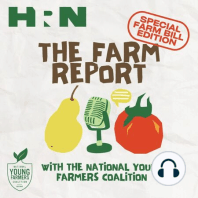41 min listen
How to Be a "Restaurant Farm" in 2020
FromThe Farm Report
ratings:
Length:
28 minutes
Released:
Jul 15, 2020
Format:
Podcast episode
Description
Chefs in Baltimore and Washington D.C. have always been Karma Farm’s best, and primary, customers. So what happens when restaurants shut down? In this episode, host Lisa Held talks to farmer Jon Shaw about how his diversified vegetable farm in Maryland has been affected by COVID-19 and about the farm’s other innovative attributes, like vegetables grown using organic practices in healthy soil outside, paired with hydroponic lettuces and herbs grown inside.In March, HRN began producing all of our 35 weekly shows from our homes all around the country. It was hard work stepping away from our little recording studio, but we know that you rely on HRN to share resources and important stories from the world of food each week. It’s been a tough year for all of us, but right now HRN is asking for your help. Every dollar that listeners give to HRN provides essential support to keep our mics on. We've got some fresh new thank you gifts available, like our limited edition bandanas.Keep The Farm Report on the air: become an HRN Member today! Go to heritageradionetwork.org/donate. The Farm Report is powered by Simplecast.
Released:
Jul 15, 2020
Format:
Podcast episode
Titles in the series (100)
Episode 6: Eric Rapp & Charlotte Swancy: Heritage talks with Eric Rapp of the Rare Hare Barn in Leonn, Kansas. Eric raises rare breed Heritage Rabbits. The second guest is Charlotte Swancy, a young Heritage Berkshire pig farmer of Riverview Farms in Georgia. by The Farm Report
